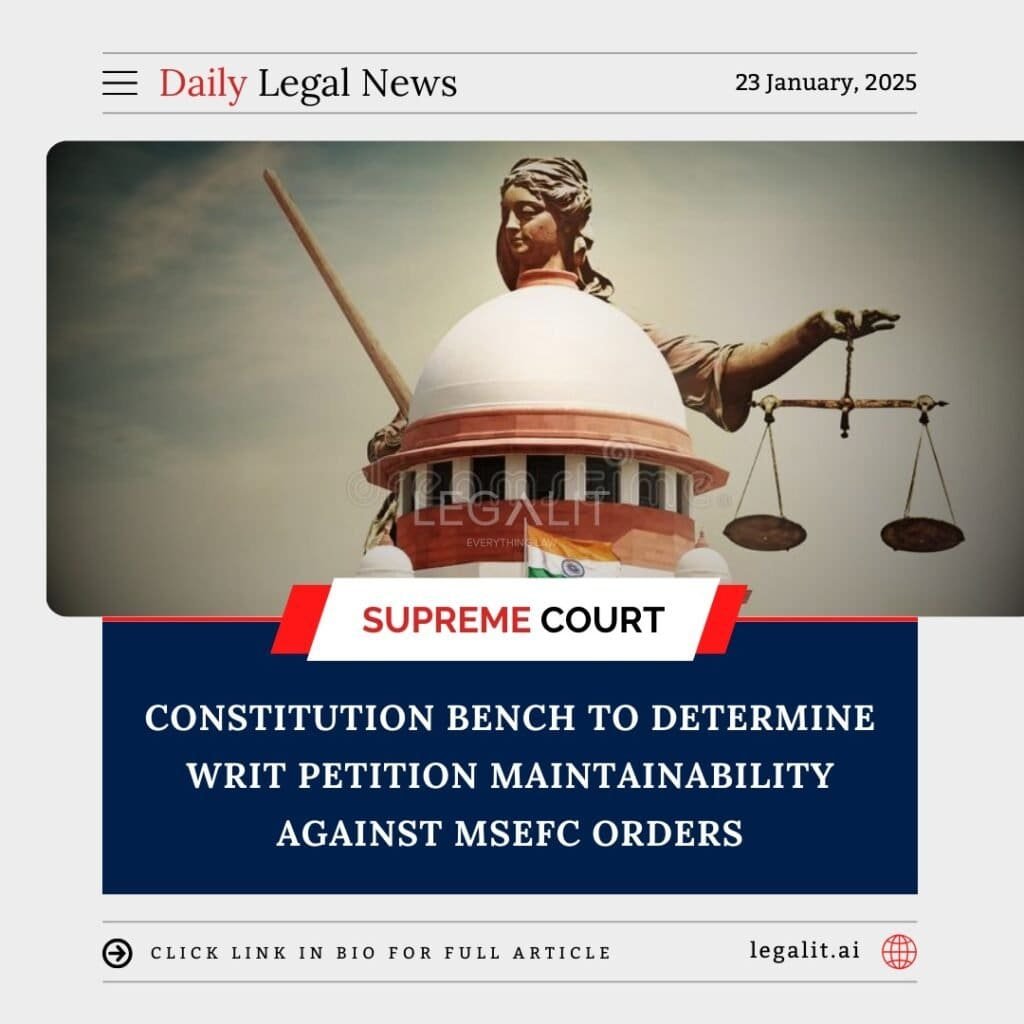
Background
The Supreme Court has referred the issue of whether writ petitions are maintainable against orders passed by Micro and Small Enterprises Facilitation Councils (MSEFC) under the Micro, Small, and Medium Enterprises Development Act, 2006 (MSMED Act), to a Constitution Bench. This decision follows conflicting judicial interpretations on the scope of judicial review concerning MSEFC orders.
The MSMED Act was enacted to protect and promote micro, small, and medium enterprises, providing them with a mechanism for speedy recovery of dues through MSEFCs. The Act mandates that disputes between suppliers and buyers must be resolved through arbitration or conciliation, with MSEFC decisions binding upon parties.
Legal Issues at Hand
The primary question before the court is whether writ petitions under Article 226 of the Constitution are maintainable to challenge MSEFC orders, given that the MSMED Act prescribes a specific appellate process under the Arbitration and Conciliation Act, 1996.
The issue is significant because it pertains to:
- Judicial Overreach vs. Legislative Intent: Balancing the judiciary’s power to intervene with the legislature’s intent to provide an expedited resolution mechanism.
- Supremacy of Special Laws: Determining whether the MSMED Act’s provisions for arbitration preclude judicial review through writ petitions.
- Implications for Businesses: Clarity on the recourse available to aggrieved parties in disputes under the MSMED framework.
Conflicting Precedents
- Support for Writ Jurisdiction:
- Some High Courts have held that writ petitions are maintainable to address violations of natural justice or instances where the MSEFC exceeds its jurisdiction.
- They argue that judicial review under Article 226 is a constitutional remedy that cannot be ousted by statutory provisions.
- Opposition to Writ Jurisdiction:
- Other judgments emphasize that parties must exhaust alternative remedies provided under the MSMED Act and the Arbitration and Conciliation Act before approaching High Courts.
- It is argued that allowing writ petitions would defeat the purpose of a time-bound dispute resolution mechanism under the Act.
Arguments Before the Supreme Court
- Petitioners’ Stand:
- Writ petitions are necessary to address instances where MSEFC decisions are arbitrary, violative of natural justice, or exceed jurisdiction.
- They contend that barring writ petitions would leave parties without effective recourse in such situations.
- Respondents’ Counter:
- The MSMED Act and Arbitration Act provide comprehensive mechanisms for dispute resolution and appeal.
- Allowing writ petitions would undermine the Act’s intent to provide an efficient and expeditious resolution framework.
Broader Implications
- Clarity on Judicial Review: The Constitution Bench’s decision will settle a contentious issue, providing much-needed clarity for businesses and courts.
- Impact on MSME Disputes: A verdict restricting writ jurisdiction could lead to greater reliance on the statutory framework, potentially expediting dispute resolution.
- Role of High Courts: The ruling will define the scope of High Courts’ supervisory jurisdiction in disputes under special laws.
Conclusion
The Supreme Court’s decision will have far-reaching consequences for the MSME sector, impacting how disputes are resolved and the extent of judicial intervention permissible in such matters. By addressing the interplay between constitutional remedies and statutory frameworks, the judgment is expected to balance the need for judicial oversight with the legislative intent of the MSMED Act. The outcome will be a critical precedent for the intersection of special laws and constitutional rights in India.